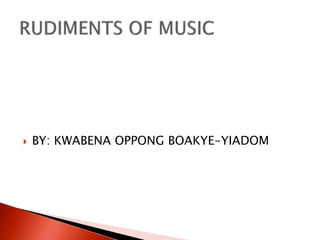Rudiments of music
•Télécharger en tant que PPTX, PDF•
4 j'aime•1,112 vues
BY PRINCE
Signaler
Partager
Signaler
Partager

Contenu connexe
Tendances (20)
Similaire à Rudiments of music
Similaire à Rudiments of music (20)
Music Appreciation Tutorial #1: Music Notation Basics

Music Appreciation Tutorial #1: Music Notation Basics
q2-music8-wk2vocalmusicofeastasia-221121003531-bf9a1265 (1).pdf

q2-music8-wk2vocalmusicofeastasia-221121003531-bf9a1265 (1).pdf
Plus de Prince Gyamfi
Plus de Prince Gyamfi (9)
Dernier
Dubai Call Girl Number # 0522916705 # Call Girl Number In Dubai # (UAE)

Dubai Call Girl Number # 0522916705 # Call Girl Number In Dubai # (UAE)Business Bay Call Girls || 0529877582 || Call Girls Service in Business Bay Dubai
(INDIRA) Call Girl Dehradun Call Now 8617697112 Dehradun Escorts 24x7

(INDIRA) Call Girl Dehradun Call Now 8617697112 Dehradun Escorts 24x7Call Girls in Nagpur High Profile Call Girls
❤ Sexy Call Girls in Chandigarh 👀📞 90,539,00,678📞 Chandigarh Call Girls Servi...

❤ Sexy Call Girls in Chandigarh 👀📞 90,539,00,678📞 Chandigarh Call Girls Servi...Chandigarh Call girls 9053900678 Call girls in Chandigarh
Dernier (20)
Dubai Call Girl Number # 0522916705 # Call Girl Number In Dubai # (UAE)

Dubai Call Girl Number # 0522916705 # Call Girl Number In Dubai # (UAE)
FULL NIGHT — 9999894380 Call Girls In Patel Nagar | Delhi

FULL NIGHT — 9999894380 Call Girls In Patel Nagar | Delhi
(INDIRA) Call Girl Dehradun Call Now 8617697112 Dehradun Escorts 24x7

(INDIRA) Call Girl Dehradun Call Now 8617697112 Dehradun Escorts 24x7
❤️Call girls in Chandigarh ☎️8264406502☎️ Call Girl service in Chandigarh☎️ C...

❤️Call girls in Chandigarh ☎️8264406502☎️ Call Girl service in Chandigarh☎️ C...
Sirmaur Call Girls Book Now 8617697112 Top Class Pondicherry Escort Service A...

Sirmaur Call Girls Book Now 8617697112 Top Class Pondicherry Escort Service A...
FULL NIGHT — 9999894380 Call Girls In Ashok Vihar | Delhi

FULL NIGHT — 9999894380 Call Girls In Ashok Vihar | Delhi
❤ Sexy Call Girls in Chandigarh 👀📞 90,539,00,678📞 Chandigarh Call Girls Servi...

❤ Sexy Call Girls in Chandigarh 👀📞 90,539,00,678📞 Chandigarh Call Girls Servi...
FULL NIGHT — 9999894380 Call Girls In Kishangarh | Delhi

FULL NIGHT — 9999894380 Call Girls In Kishangarh | Delhi
Barasat call girls 📞 8617697112 At Low Cost Cash Payment Booking

Barasat call girls 📞 8617697112 At Low Cost Cash Payment Booking
Deconstructing Gendered Language; Feminist World-Making 2024

Deconstructing Gendered Language; Feminist World-Making 2024
FULL NIGHT — 9999894380 Call Girls In Delhi | Delhi

FULL NIGHT — 9999894380 Call Girls In Delhi | Delhi
❤Personal Whatsapp Srinagar Srinagar Call Girls 8617697112 💦✅.

❤Personal Whatsapp Srinagar Srinagar Call Girls 8617697112 💦✅.
FULL NIGHT — 9999894380 Call Girls In Badarpur | Delhi

FULL NIGHT — 9999894380 Call Girls In Badarpur | Delhi
Call Girls in Sakinaka 9892124323, Vashi CAll Girls Call girls Services, Che...

Call Girls in Sakinaka 9892124323, Vashi CAll Girls Call girls Services, Che...
8377087607, Door Step Call Girls In Kalkaji (Locanto) 24/7 Available

8377087607, Door Step Call Girls In Kalkaji (Locanto) 24/7 Available
Call Girls Ludhiana Just Call 98765-12871 Top Class Call Girl Service Available

Call Girls Ludhiana Just Call 98765-12871 Top Class Call Girl Service Available
FULL NIGHT — 9999894380 Call Girls In Paschim Vihar | Delhi

FULL NIGHT — 9999894380 Call Girls In Paschim Vihar | Delhi
FULL NIGHT — 9999894380 Call Girls In Dwarka Mor | Delhi

FULL NIGHT — 9999894380 Call Girls In Dwarka Mor | Delhi
Verified # 971581275265 # Indian Call Girls In Deira By International City Ca...

Verified # 971581275265 # Indian Call Girls In Deira By International City Ca...
Rudiments of music
- 1. BY: KWABENA OPPONG BOAKYE-YIADOM
- 2. What the rudiments of music are. An introduction to notation
- 3. The rudiments of music are the basic elements of music theory. They include the musical notation, pitch , time , scales , key signatures, time signatures and intervals together with their typical uses in melody and harmony. The rudiments of music are those elements of theory that are normally learned, more or less explicitly, as part of learning to play any musical instrument, as distinct from the more abstract aspects of theory that would be studied as a more academic, discipline
- 4. THE STAVE/STAFF All music is upon, between and around five lines called staff/stave.
- 5. BARS Every piece of music is divided up into equal measures by vertical lines called bars. Each bar must contain a certain number of notes and rests, or both, regulated by figures at the beginning of the music called time signature. A double bar line is used to end a part of or whole of a composition.
- 6. LINE NOTES = when the Space notes= when runs through the middle note is between the of a note. Lines, in a space.
- 7. Notes on the stave are determined by use of signs known as clefs.
- 8. Treble stave notes Bass stave notes
- 9. The stem of a note on the middle line can go up or down but normally lower note stems go up and higher go down. To provide for notes which lie above or below the stave, short additional lines called ledger lines are used . Each note above or below the stave has its own line or lines.